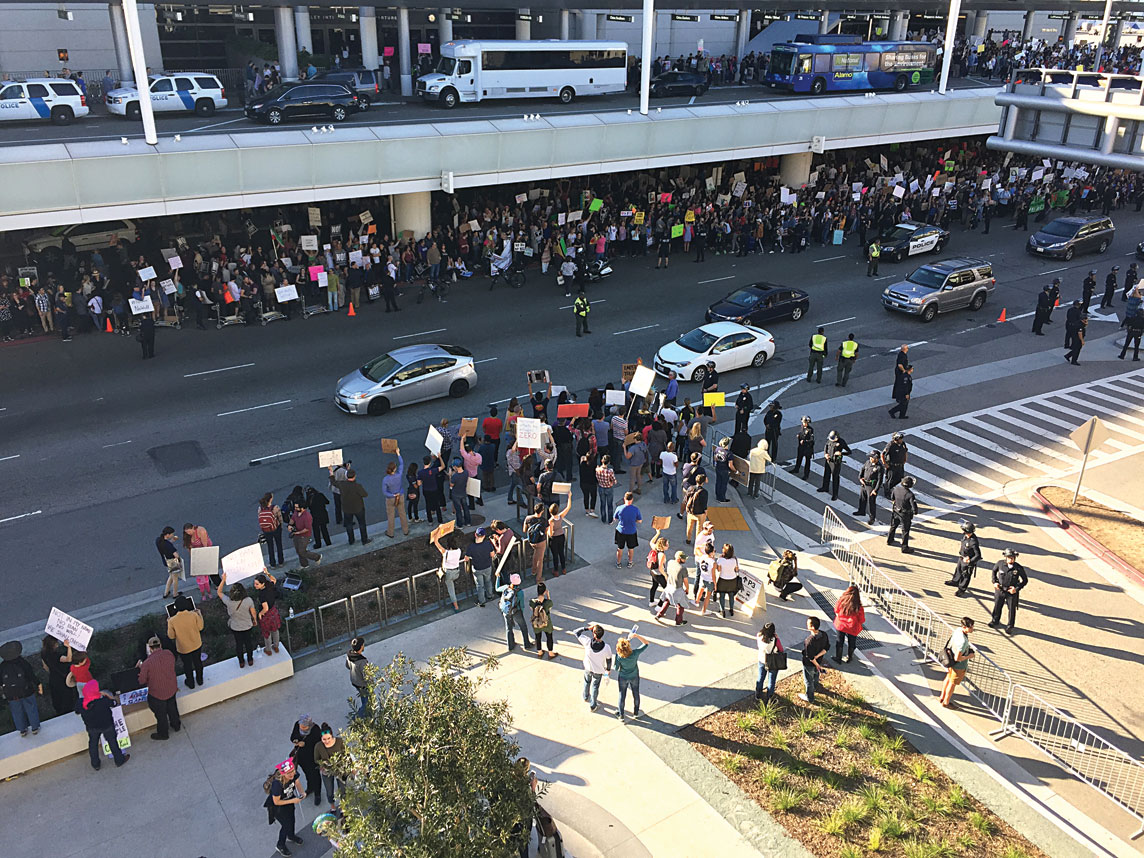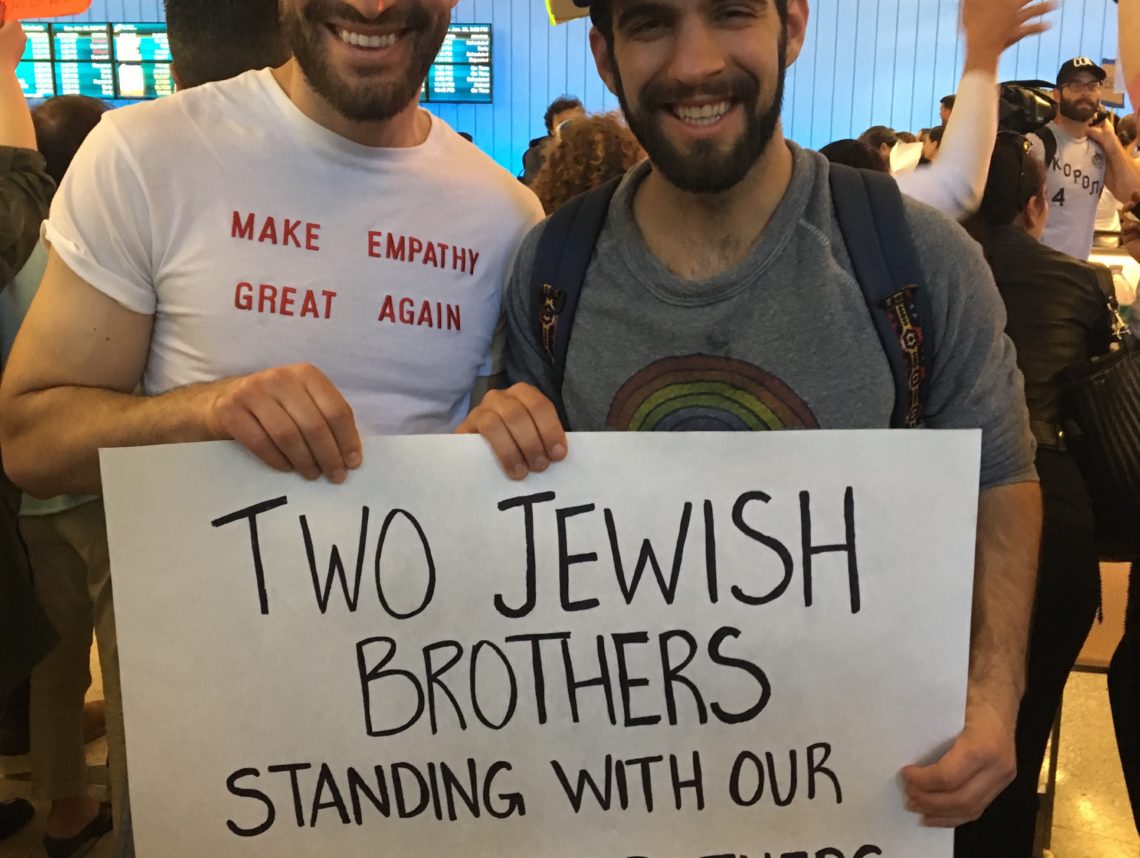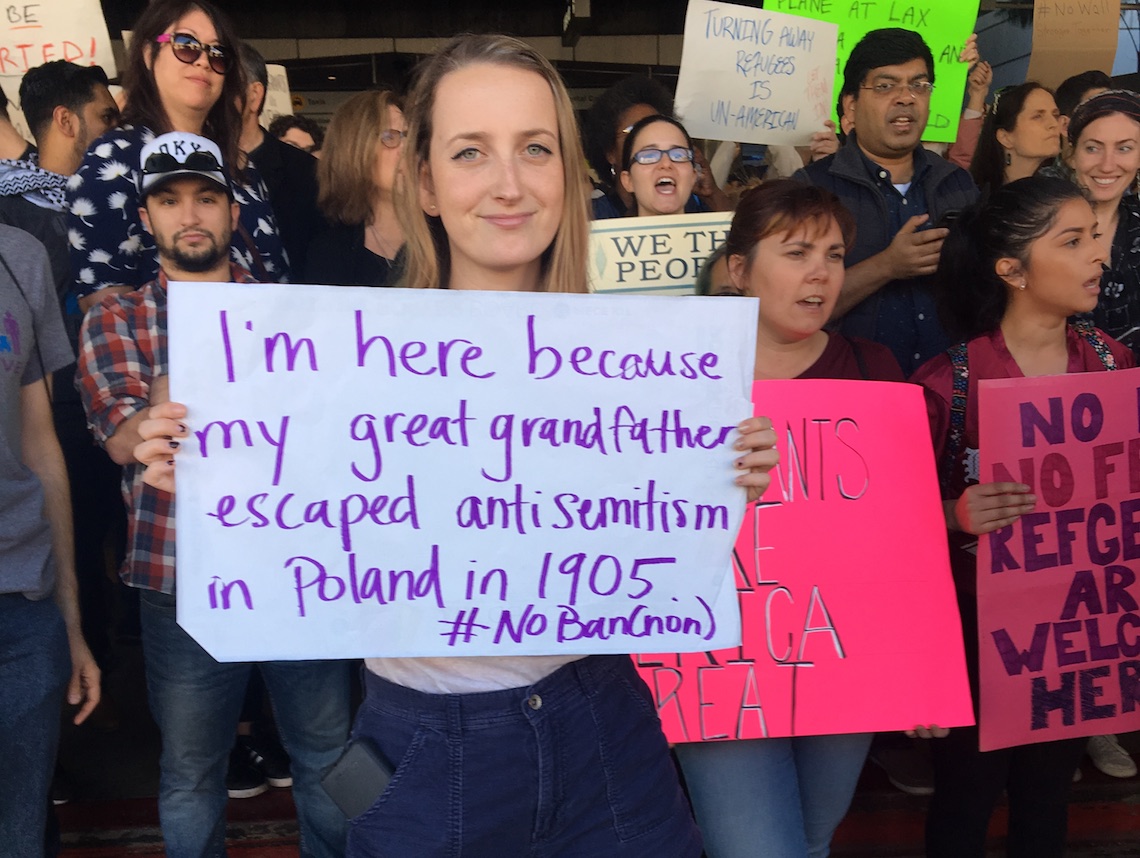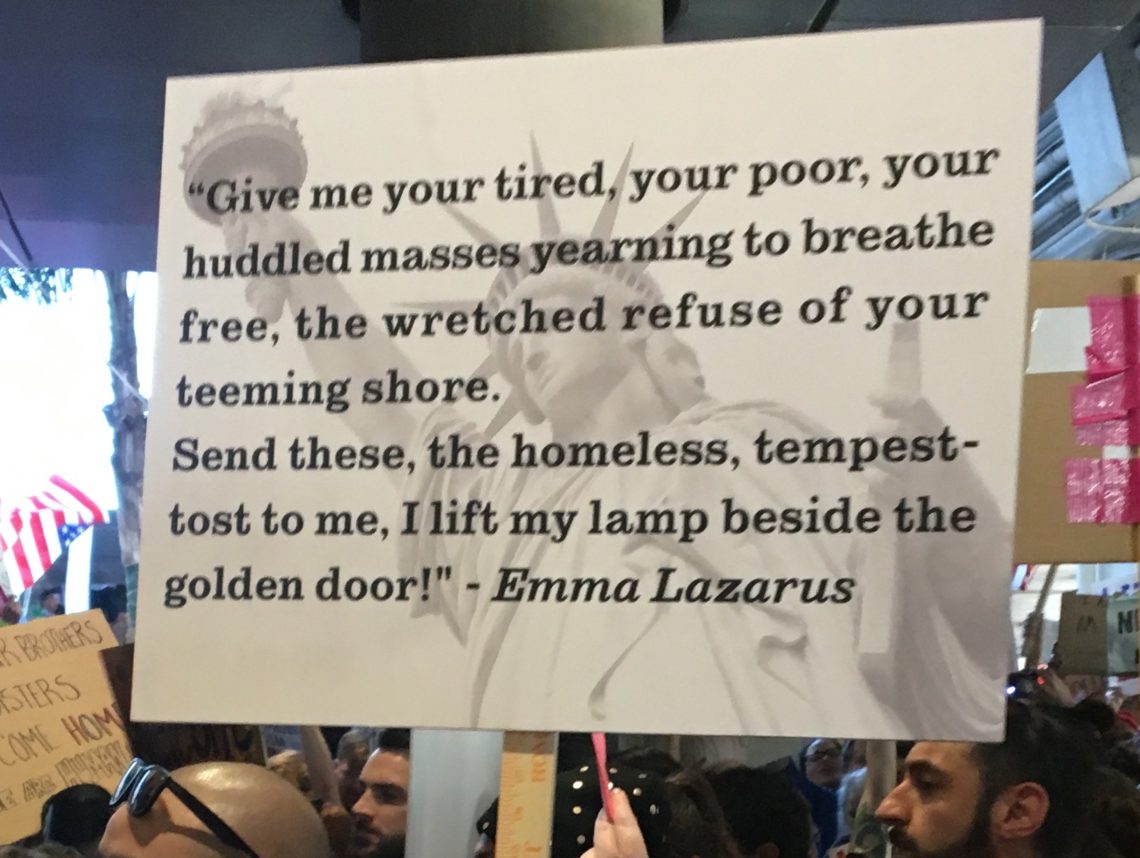 Thousands gathered to protest at Los Angeles International Airport on Jan. 29. Photo by Eitan Arom
Thousands gathered to protest at Los Angeles International Airport on Jan. 29. Photo by Eitan Arom Shortly before Shabbat fell on Jan. 27, President Donald Trump signed an executive order that effectively slammed the door on refugees seeking entry to the United States — at least for now.
Shock and dismay had been building in the Jewish community since a draft of the order was leaked days beforehand, and on Jan. 28, those sentiments exploded onto Rabbi Susan Goldberg’s cellphone in the form of concerned messages from her congregants at Wilshire Boulevard Temple.
“When Shabbat ended last night, my phone was blowing up — emails, photos,” she said Jan. 29 as a crowd milled past her at the arrivals gate at Los Angeles International Airport (LAX). “For Jews, there’s a clear line that’s been crossed.”
The airport protest came as a grass-roots reflection of simmering anger in the organized Jewish community. The days before the executive order saw statements from Jewish organizations ranging from the Orthodox Union to the Anti-Defamation League expressing their ire, and in some cases promising to fight the administration.
At LAX, where a number of travelers had been detained because of the order, thousands poured through terminals and onto the curbs the afternoon of Jan. 29. Police cut off traffic through much of the airport and largely gave protesters the run of Tom Bradley International Terminal.
Many protesters were Jews from congregations across the city, and even on signs held aloft by non-Jews, a certain Jewish influence could be detected in references to 1930s Germany and proclamations of “Never again.”
“Our country once made the mistake of shutting its doors to nearly 1,000 refugees on the S.S. St. Louis — people died as a result,” said Rabbi Morley Feinstein of University Synagogue, reached by phone shortly after the order was signed. “We don’t want to see that happen again.”
To be sure, there are plenty of Jews who support the ban or parts of it and others who dispute analogies to the Holocaust. “Analogy to 1930s Jews is recklessly false,” a statement from Morton A. Klein, president of the Zionist Organization of America (ZOA), declared the day before the order was signed.
But some community members who voiced their support for Trump’s order did so at their own peril, including Simon Etehad, a personal injury lawyer in Beverly Hills, who was born in Iran and fled the Islamic Revolution in 1979.
 “You have no idea how many friends I lost on Facebook because of my opinion … but I believe that he’s doing a wonderful job,” he said.
“You have no idea how many friends I lost on Facebook because of my opinion … but I believe that he’s doing a wonderful job,” he said.
“Even if I would have been personally affected by this ban, I would still support it,” he wrote in a follow-up email. “Because I am not willing to endanger the life of a single U.S. citizen so that my family members might have an easier travel experience in the next 90 days!”
The people who showed up Jan. 29 at LAX didn’t quite see it that way.
“There are a lot of Jews here — a lot,” Goldberg said from the airport, joined by her three children and her husband, who translated as she spoke in sign language, since she’d lost her voice.
‘Let them in!’
As weary travelers emerged to boisterously chanting crowds, Adam and Noah Reich held a sign reading, “Two Jewish brothers standing with our Muslim brothers.” While they spoke with a reporter, a short woman with olive skin, a total stranger, walked up and hugged both of them. That type of thing had been going on all afternoon.
“Maybe like, a dozen so far,” Noah said. “We’ve been here for a couple hours and people just come up to us.”
“The collective power of everyone here is saying, ‘You’re not alone; we’re all here for you,’ ” Adam said. “And I think that’s a powerful thing.”
Emerging from the crowd, Jesse Gabriel, an attorney and executive board member at The Jewish Federation of Greater Los Angeles, put his hand on Noah’s shoulder.
“Kol ha-kavod,” he told the pair, using a Hebrew expression for “Well done!”
Gabriel was one of dozens of attorneys swarming the terminal, many with signs reading “lawyer” and announcing their foreign language proficiencies, hoping to be of help to stranded travelers or those recently released by Immigration and Customs officers.
“When you have individuals whose rights need to be protected, that’s when lawyers need to step in,” Gabriel said.
In fact, there was little work for the attorneys at the terminal, since those detained were stranded elsewhere, in the bowels of LAX, incommunicado. The crowds were chanting, “Let them in!” but lawyers were struggling even to make contact with those stranded.
“Our understanding is that there are a number of people with legal travel documents who are being detained in customs and border patrol, in custody,” said immigration attorney Michael Hagerty.
Hagerty was serving as ad hoc media liaison to a group of attorneys at the airport (as announced by a cardboard sign reading “media liaison”). Among his charges were representatives from legal aid clinic Public Counsel and the local American Civil Liberties Union. But information about those in limbo -— even a basic head count — proved difficult to come by.
“We don’t know who they are, we don’t know exactly what their legal status is on an individual basis, but in all likelihood, they are legal permanent residents, they are refugees with legal refugee travel documents, people with student visas,” Hagerty said.
As he spoke, wayfarers cut through surging crowds, pushing carts and lugging suitcases. For those just arriving, it must have presented an overwhelming scene: shouts of “USA!” from flamboyantly dressed protesters, their signs decorated with images ranging from the Statue of Liberty to Trump with a Hitler mustache, and outside, drums banging out an incessant beat.
Marchers mobbed the sidewalk on both the upper and lower levels, along with the international terminal itself. The crowd lined the curb, waving signs at passing cars, and some took to the upper levels of parking garages across the street to look down over the scene.
Some travelers decided to join the protest, including Zoe Lister-Jones, a filmmaker who had just stepped off the plane after screening her new comedy, “Band Aid,” at the Sundance Film Festival in Utah.
“I’ve been witnessing the injustices occurring from Park City and I came straight from the arrivals terminal to protest,” she said. “As a Jew, I think it’s part of our bloodline to stand up to injustice and resist fascism.”

Across Airport Way from the mass of protesters stood Michael Chusid, a kind of greeter. The tall, bearded, middle-aged Encino man held a sign that read “Welcome” in English, Arabic and Hebrew.
“My grandparents came from Lithuania and Ukraine,” Chusid said. “My grandfather was the only one to survive from his whole family. The only thing that is left in Lithuania is tombstones.
“That’s why I’m here,” he said as he teared up.
Clergy respond
News of the order quickly raised a chorus of rabbis in opposition.
The Central Conference of American Rabbis, for instance, a consortium of Reform clergy, has been abuzz with outrage at the new policy, Feinstein said.
“We know full well when people come after minorities, they don’t stop with one,” he told the Journal. “History shows this to be the canary in the mine.”
At the airport, the crowd included enough rabbis to start a seminary.
“This country is an expression of the best of what the world has to offer,” Rabbi Ron Stern of Stephen Wise Temple said at LAX. “And to be that, it has to be open to immigrants. It has to reflect the values that we hold dear as Jews.”
Rabbi Neil Comess-Daniels of Beth Shir Shalom in Santa Monica stood alone on the sidewalk outside the terminal wearing a yarmulke and prayer shawl, having been unable to locate his congregants in the chaos.
“I wanted people to know that the Jewish people feel a chill up our spine because this is happening,” he said.
Leading up to the refugee order, HIAS, a refugee resettlement agency formerly known as the Hebrew Immigrant Aid Society, recruited more than 1,700 rabbis across the denominational spectrum to sign a statement welcoming refugees to the United States. They included Rabbis Sharon Brous of IKAR, Adam Kligfeld of Temple Beth Am, Stan Levy of B’nai Horin, and Yoshi Zweiback of Stephen Wise Temple, as well as Feinstein and Stern.
Reached by phone Jan. 27, shortly after Trump signed the order, Kligfeld noted that the Exodus story obliges Jews “to advocate for our country to continue to have its arms and heart open to the bedraggled and impoverished and persecuted.” But he sounded a note of sympathy with community members who want to protect the nation’s ports of entry.
“I find myself in a centrist place on this issue,” he continued. “I’m proud of our country’s history regarding Jewish and non-Jewish refugees. I think we also live in a scary world.”
Representing the nation’s Orthodox rabbinate, the Orthodox Union and the Rabbinical Council of America reaffirmed a joint statement issued in December 2015 blasting the idea of a Muslim ban. Taken together with reproving statements from the Reconstructionist, Reform and Conservative movements, the Orthodox groups’ opposition brings every major strain of American Judaism into alignment against the immigration measures.
Struggling over security, Holocaust memory
The Orthodox rabbi’s statement fell far short of other proclamations by large Jewish organizations, some of which promised an outright battle with the administration.
The Anti-Defamation League (ADL), a nonpartisan group that was critical of candidate Trump, found fighting words: “ADL relentlessly will fight this policy in the weeks and months to come,” CEO Jonathan Greenblatt said in a statement, responding ahead of time to a leaked draft. “Our history and heritage compel us to take a stand.”
American Jewish Committee CEO David Harris also reached for Jewish heritage to motivate his opposition.
“We are all related to those fortunate enough to have been admitted to this country — in my case, my mother, father, wife, and daughters-in-law,” he said in a statement. “And we believe that other deserving individuals merit the same opportunities to be considered for permanent entry.”
The Simon Wiesenthal Center protested the idea of a nationality-based ban in a statement the day of the order while steering clear of Holocaust imagery. But the same day, International Holocaust Remembrance Day, it criticized Trump for not mentioning Jews in a statement about the Holocaust — a week after the Wiesenthal Center’s founder, Rabbi Marvin Hier, offered a prayer at Trump’s inauguration.
Among the leaders of large Jewish institutions, ZOA’s Klein offered a rare note of support for Trump’s measures, saying in the statement his group “is appalled that left-wing Jewish groups such as the Anti-Defamation League (ADL) and the Reform Movement are ‘strongly condemning’ this draft Executive Order.”
He took umbrage with comparisons to Jewish refugees.
“No Jewish immigrants flew airplanes into buildings, or massacred scores of innocent people at a holiday party or nightclub or marathon or drive trucks into innocent citizens,” Klein said in the statement.
Though unusual within the Jewish establishment, Klein’s thesis found support in some pockets of the community, including some who are recent immigrants themselves.
“It is simply disgraceful to compare Trump to Hitler or his actions to those of the Nazi era,” Etehad wrote in the email.
Eugene Levin, president of Panorama Media Group, which operates a radio
station and two Russian-language weekly newspapers in Los Angeles, said he supports Trump’s ban on immigrants from several predominantly Muslim countries because there is no way of doing a thorough background check and knowing if someone is not a disguised terrorist.
“Many individuals with questionable backgrounds from the Soviet Union moved here as refugees. Think about [the] Tsarnaev brothers, who were able to immigrate here as refugees,” he said, referring to the perpetrators of the Boston Marathon bombing in 2013.
“I believe what Trump did was a necessary step,” he added.
Muslims “are against the Jewish people,” said Roman Finarovsky, who grew up in Ukraine at a time when going to a synagogue could result in losing one’s job if caught by the KGB.
 But some saw in the struggle of Soviet Jews cause to oppose the ban. Former Los Angeles County Supervisor Zev Yaroslavsky was an activist in the free Soviet Jewry movement as a student at UCLA. While several members of the Russian Jewish community expressed support for the ban, Yaroslavsky strongly denounced it.
But some saw in the struggle of Soviet Jews cause to oppose the ban. Former Los Angeles County Supervisor Zev Yaroslavsky was an activist in the free Soviet Jewry movement as a student at UCLA. While several members of the Russian Jewish community expressed support for the ban, Yaroslavsky strongly denounced it.
“I find it to be abhorrent and contrary to every fiber of my being as a human rights activist, as an activist for Soviet Jewry in earlier years, as a civil libertarian, which I am,” Yaroslavsky said of the executive order in a phone interview. “This is un-American, literally un-American.”
Galvanizing young Jews
Shay Roman, 27, stood with two friends at LAX, all three wearing T-shirts from the group IfNotNow, a network of Millennial Jews that protests the status quo in the West Bank and Gaza.
“I’m here especially as a Jew,” Roman said. “I feel it’s so important to show support for other communities, especially the refugee community.”
“Our generation is absolutely not apathetic,” one of his companions, Jonah Breslau, 25, added. “We’re a group of young Jews and our core values are about freedom and dignity for all people — Israeli and Palestinians, Jews and Muslims.”
Danit Osborn, 22, cited her background as both Jewish and Cambodian as part of her reason for being there. She said she wasn’t sure the protest would accomplish any specific policy reform.
“I’m not sure we’re gonna change Donald Trump,” she said. “But I have to be here for my mother and I have to be here for my father.”
Olga Grigoryants, Ryan Torok, Danielle Berrin and Rob Eshman contributed to this report.























 More news and opinions than at a Shabbat dinner, right in your inbox.
More news and opinions than at a Shabbat dinner, right in your inbox.